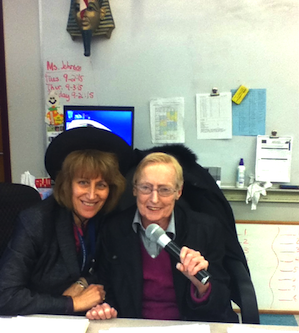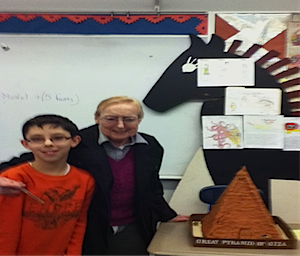Interview:54AmazingYears
by Laurie Wasserman
 In several of my blog posts at Two Teachers in the Room, I’ve made reference to my history teammate Pauline Walker, whom I’ve co-taught with for many years (since our middle school opened in 2001, in fact). She has been teaching longer than any other colleague I know, and still has her passion and excitement for working with kids as she approaches her ninth decade of life!
In several of my blog posts at Two Teachers in the Room, I’ve made reference to my history teammate Pauline Walker, whom I’ve co-taught with for many years (since our middle school opened in 2001, in fact). She has been teaching longer than any other colleague I know, and still has her passion and excitement for working with kids as she approaches her ninth decade of life!
Recently I interviewed Pauline about a teaching career that (so far) has seen an amazing 54 First Days of School.
When did you first know you wanted to become a teacher?
That’s a funny thing. Originally, I wanted to be a professional musician — I played the clarinet and the alto clarinet — but my mother didn’t want to sanction me to a career in music.
I’d always been involved with children: I was a playground instructor and then a playground supervisor, and teaching was my second career choice.
My mother grew up during The Great Depression and never got over it. She wouldn’t pay for college if I studied music. I was so mad because back then she sent my two younger brothers to Boston University and Boston College, because ‘you educated the boys first,’ even though I was the oldest.
She felt I would just get married, have children and it would have been all thrown away. I was so angry I paid for college myself. I used my savings from being a playground instructor to attend the old Boston Teacher College and prepare for a life-long career.
You began teaching in the Eisenhower Administration! What was your first teaching job?
My first teaching job was teaching 3rd grade. I did that for 11 years, until I left for two years to be home with my two children (one of whom is now a professional musician, ironically).

Teaching with Pauline. I’m wearing a hat for a fundraiser; the mask on the board is a former student’s project. We often use a microphone so students with hearing loss can hear better through our FM system.
Kids are more sophisticated and knowledgeable today. When I first starting teaching kids, the emphasis was on reading. Now they have more toys and technology — cellphones, computers, video games — and the world is a very different place.
The kids today want to be treated like adults. I tell them, ‘I will treat you like an adult but you must act like one.’ For example, I teach them about Ancient Greece with statues of nude people. I tell them they can’t laugh and smirk; they need to act maturely.
Today you have to go with the times. Young people back then didn’t have the problems they do today: home life difficulties, drugs, alcohol, and just this week, the tragic situation at The Boston Marathon.
You have been a teacher for an amazing 54 years. Please share what has been your most memorable moment as a teacher.
There have been many…I was an elementary 5thgrade teacher, and I had a student, Emily Mann, who wanted to be a writer. I always found a way to focus on what my students did best, and encouraged them to find an area to be successful. She wrote about me in her letter of admission to college; she wrote about me as her inspiration. I then received an award because of her letter, in “Who’s Who Among American Teachers.” I had another student, Christine Yiannacropolis, who became a teacher, because (she told me)”You told us we were going to learn, whether we wanted to be successful or not.” I still run into her at the supermarket, and she’s still teaching, too.
Where have you taught? What schools, grades, and subjects?
I’ve always taught in the same community where I grew up and still live. When I returned to teaching from having my two children, my principals always wanted me to move up (to teach upper grades because I could manage the behavior) but I loved grade 3. I taught combined Gr. 2 & 3, 3 & 4, 4th grade, 5th grade and 4 & 5. I then became a self-contained 6th grade teacher (teaching all subjects) and then we moved into a junior high school, which later became a middle school. Since it became a middle school, I’ve taught Ancient World History.

Pauline displays students’ projects on The Trojan Horse, an artifact from a previous student project years ago. Pauline provides many opportunities for students to demonstrate their understanding of the subject: maps done in groups; portfolios of classwork, open notebook/binder tests; Greek vases; weekly trivia questions; film notes. She uses many ways to assess students’ understanding. They present their projects, sharing facts about it and how they constructed it.
You are a Social Studies teacher, or as you like to say, “Ancient World History.” Why this particular subject?
I was also inspired by a teacher. I found my niche teaching about ancient civilizations due to a teacher I had in 8th grade, Ms. Brown. She was super, and I really enjoyed the subject because of her and developed a passion for it.
I started teaching with another teacher about 20 years ago. It’s difficult when one person doesn’t want to share in the responsibility of “the kids come first.” It works if you like each other and share the same philosophy. It’s really as simple as that.
You could have retired long ago. Why are you still teaching today?
I still like it because of the subject I teach.
I smiled when I heard this answer. What Pauline didn’t say but what she demonstrates on a regular basis is how much she enjoys teaching and working with young adolescents. Kids and adults continue to come back and visit her year after year, and she remembers their names, their families, where they attended college, what professions they chose, and often a funny anecdote about when they were her student. She has often shared with me her core attitude about the students she teaches during those times when we have co-taught kids with significant challenges: “I teach who is in front of me.”
With all of your vast experience as a veteran teacher, what advice would you give someone just starting in teaching?
Teaching today is more difficult than it appears. Make sure you really want to do this.


You need to be a member of School Leadership 2.0 to add comments!
Join School Leadership 2.0